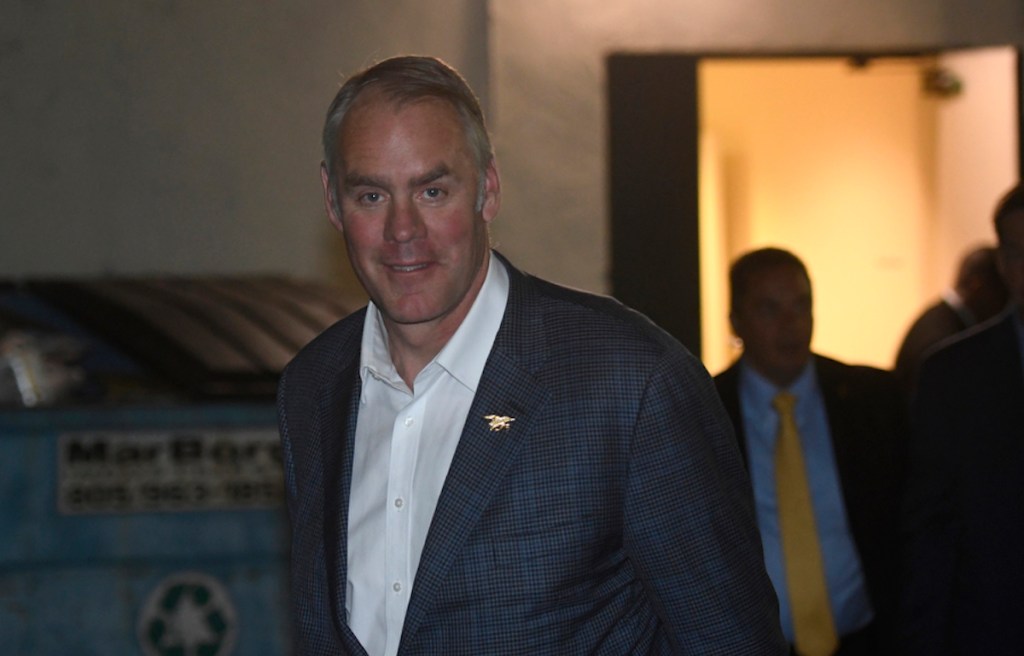Ryan Zinke, the former Secretary of the Department of the Interior under then-president Donald Trump and erstwhile Santa Barbara resident, repeatedly violated federal ethics rules that bar high-ranking administration officials from conducting private business negotiations with individuals over whom they might have regulatory oversight. In addition, the federal Office of Inspector General found that Zinke repeatedly and knowingly gave false information to the Designated Agency Ethics Official with the Department of Interior who investigated the claims once they surfaced in a newspaper article. Both these findings were made public in a 32-page report issued this week by the Office of Inspector General.
Zinke did not, however, violate federal conflict-of-interest rules, as the negotiations he conducted involved no official actions or government business.
Zinke, a frequent visitor to his wife’s family’s Santa Barbara home on the Mesa, was appointed by President Trump to serve as Secretary of the Department of the Interior in 2017 and resigned in January 2019 in the face of multiple allegations of ethics violations. He is currently running for the Republican nomination for Congress in his home state of Montana.
When sworn in as Secretary of Interior, Zinke signed multiple legal documents stating he had recused himself from any operational oversight or involvement with a family foundation, the Great Northern Veterans Peace Park Foundation he started in 2007 with his wife, Lola Hand Zinke. This foundation owned five acres of land in Zinke’s hometown of Whitefish, Montana.
Despite his sworn written attestations, Zinke had, in fact, been actively and aggressively involved in real estate negotiations with three investors — one of whom happened to be David Lesar, then the chair of major oil corporation Halliburton — who were pursuing a major mixed-use development scheme known as 95 Karrow on land immediately adjacent to the Zinke foundation’s five acres.
In 2017 and 2018, Zinke — then serving as Secretary of Interior — was intensely negotiating with these three investors, who were eager to use his foundation’s land to build a parking lot. In fact, Zinke was hoping to leverage that land to secure exclusive rights to sell liquor at the microbrewery the three investors hoped to build.
Before the story broke, it would turn out, Zinke had helped coordinate media spin with the investors, stressing that he had no more than nominal involvement in the negotiations, insisting that his Santa Barbara-born-and-bred wife was in charge. After the story broke and the ethics investigators with the Department of the Interior questioned Zinke, he insisted to them his involvement was “de minimis.” In fact, he told the investigators how he had repeatedly rebuffed efforts by the investors to discuss the plans.
Sign up for Indy Today to receive fresh news from Independent.com, in your inbox, every morning.
Zinke and his wife both refused to meet with the Office of the Inspector, who responded by issuing subpoenas for Zinke’s voicemail, texts, emails, and other documents. They would discover records that Zinke had communicated with the investors 64 times.
Once, in August 2017, the three investors visited Zinke at his Department of Interior offices, where they met and conferred. His staff helped arrange the meeting and handle email correspondences afterward, a clear breach of rules prohibiting federal staff from working on the private business affairs of office holders. Later that night, the four went out to dinner at a D.C. restaurant, after which Zinke led them on a personal tour of the Lincoln Memorial, accompanied all the while by his government security detail.
In initial press accounts, it was reported that Zinke’s staff had been instructed to cover up their involvement. The Office of Inspector General concluded there was no basis for that. Likewise, the Office discovered no evidence that Zinke gave any special treatment to Halliburton, which has major oil and gas interests on federal lands over which the Department of the Interior has immediate jurisdiction. Zinke, as Secretary of the Interior, was aggressively pro-oil development, preaching the gospel of “energy dominance.”
By November 2018, Zinke found himself embroiled in multiple controversies surrounding alleged ethical breaches. In November that year, his wife would rescind the foundation’s letter of intent to go into the 95 Karrow land deal with the three investors. On January 2, 2019, he would resign as Secretary of Interior with a year left on his term of office.
He would say then that the cost and aggravation of defending himself against so many accusations — all baseless or exaggerated, he insisted — was not worth it. He has dismissed the Office of Inspector General’s findings in a similar fashion, describing it as politically motivated.
Support the Santa Barbara Independent through a long-term or a single contribution.

